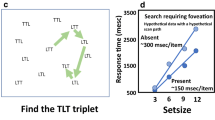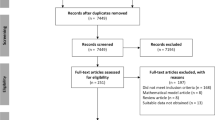Abstract
In 1977, Navon argued that perception is biased towards the processing of global as opposed to local visual information (or the forest before the trees) and implicitly assumed this to be true across places and cultures. Previous work with normally developing participants has supported this assumption except in one extremely remote African population. Here, we explore local–global perceptual bias in normally developing African participants living much less remotely than the African population tested previously. These participants had access to modern artefacts and education but presented with a local bias on a similarity-matching Navon task, contrary to Navon’s assumptions. Nevertheless, the urban and more educated amongst these participants showed a weaker local bias than the rural and less educated participants, suggesting an effect of urbanicity and education in driving differences in perceptual bias. Our findings confirm the impact of experience on perceptual bias and suggest that differences in the impact of education and urbanicity on lifestyles around the world can result in profound differences in perceptual style. In addition, they suggest that local bias is more common than previously thought; a global bias might not be universal after all.




Similar content being viewed by others
Notes
As of 2018, the study was cited more than 3000 times.
According to the African Bank of Development, Rwanda’s real GDP grew by an average of 8% annually during the period 2000 to 2013, which is among the highest average growth rates in Africa (see “Rwanda − 2014 - Country Profile - African Development Bank”; http://www.afdb.org). According to the World Bank, Rwanda might become a middle income country by 2020 (http://www.worldbank.org/en/country/rwanda/overview).
This reanalysis left the data largely unchanged because the 6 stimuli used in this study were purposefully selected to be representative of performance on the full version of the test.
References
Andrews, G., Slade, T., & Peters, L. (1999). Classification in psychiatry: ICD–10 versus DSM–IV. British Journal of Psychiatry, 174, 3–5. https://doi.org/10.1192/bjp.174.1.3.
Arnett, J. (2008). The neglected 95%: Why American psychology needs to become less American. American Psychologist, 63, 602–614. https://doi.org/10.1037/0003-066X.63.7.602.
Beer, J. (1989). Learning effects while passively viewing the Necker cube. Perceptual and Motor Skills, 69, 1391–1394. https://doi.org/10.2466/pms.1989.69.3f.1391.
Blanchard, E. B., Jones-Alexander, J., Buckley, T. C., & Forneris, C. A. (1996). Psychometric properties of the PTSD checklist (PCL). Behaviour Research and Therapy, 34, 669–673. https://doi.org/10.1016/0005-7967(96)00033-2.
Bolton, P., & Ndogoni, L. (2000). Cross-cultural assessment of trauma-related mental illness: CERTI crisis and transition tool kit. Baltimore: Johns Hopkins University, World Vision International.
Bremner, A. J., Doherty, M., Caparos, S., De Fockert, J., Linnell, K. J., & Davidoff, J. (2016). The ontogeny of visual context effects: Tracing effects of culture and the urban environment on the development of the Ebbinghaus illusion in British and Namibian observers. Child Development, 87, 962–981. https://doi.org/10.1111/cdev.12511.
Brounéus, K. (2010). The trauma of truth telling: Effects of witnessing in the Rwandan Gacaca courts on psychological health. Journal of Conflict Resolution, 54, 408–437. https://doi.org/10.1177/0022002709360322.
Caparos, S., Ahmed, L., Bremner, A., De Fockert, J., Linnell, K. J., & Davidoff, J. (2012). Exposure to an urban environment alters the local bias of a remote culture. Cognition, 122, 80–85. https://doi.org/10.1016/j.cognition.2011.08.013.
Caparos, S., Fortier-St-Pierre, S., Gosselin, J., Blanchette, I., & Brisson, B. (2015). The tree to the left, the forest to the right: Political opinions and perceptual bias. Cognition, 134, 155–164. https://doi.org/10.1016/j.cognition.2014.10.006.
Caparos, S., Giroux, S. V., Rutembesa, E., Habimana, E., & Blanchette, I. (2018). Twenty years later, the cognitive portrait of openness to reconciliation in Rwanda. British Journal of Psychology, 109, 362–385. https://doi.org/10.1111/bjop.12275.
Caparos, S., Linnell, K. J., Bremner, A., De Fockert, J., & Davidoff, J. (2013). Do local and global perceptual biases tell us anything about local and global selective attention? Psychological Science, 24, 206–212. https://doi.org/10.1177/0956797612452569.
Chamberlain, R., Van der Hallen, R., Huygelier, H., Van de Cruys, S., & Wagemans, J. (2017). Local-global processing bias is not a unitary individual difference in visual processing. Vision Research, 141, 247–257. https://doi.org/10.1016/j.visres.2017.01.008.
Dehaene, S., Cohen, L., Morais, J., & Kolinsky, R. (2015). Illiterate to literate: Behavioural and cerebral changes induced by reading acquisition. Nature Reviews Neuroscience, 16, 234–244. https://doi.org/10.1038/nrn3924.
Dale, G., & Arnell, K. M. (2013). Investigating the stability of and relationships among global/local processing measures. Attention, Perception & Psychophysics, 75, 394–406. https://doi.org/10.3758/s13414-012-0416-7.
Davidoff, J., Fonteneau, E., & Fagot, J. (2008). Local and global processing: Observations from a remote culture. Cognition, 108, 702–709. https://doi.org/10.1016/j.cognition.2008.06.004.
De Fockert, J., Davidoff, J., Fagot, J., Parron, C., & Goldstein, J. (2007). More accurate size contrast judgments in the Ebbinghaus illusion by a remote culture. Journal of Experimental Psychology: Human Perception and Performance, 33, 738–742. https://doi.org/10.1037/0096-1523.33.3.738.
De Fockert, J. W., & Cooper, A. (2014). Higher levels of depression are associated with reduced global bias in visual processing. Cognition & Emotion, 28, 541–549. https://doi.org/10.1080/02699931.2013.839939.
Derogatis, L. R., Lipman, R. S., Rickels, K., Uhlenhuth, E. H., & Covi, L. (1974). The Hopkins Symptom Checklist (HSCL): A self-report symptom inventory. Behavioral Science, 19, 1–15. https://doi.org/10.1002/bs.3830190102.
De Lillo, C., Spinozzi, G., Truppa, V., & Naylor, D. M. (2005). A comparative analysis of global and local processing of hierarchical visual stimuli in young children (Homo sapiens) and monkeys (Cebus apella). Journal of Comparative Psychology, 119, 155–165. https://doi.org/10.1037/0735-7036.119.2.155.
Dukette, D., & Stiles, J. (2001). The effects of stimulus density on children’s analysis of hierarchical patterns. Developmental Science, 4, 233–251. https://doi.org/10.1111/1467-7687.00168.
Firestone, C., & Scholl, B. J. (2016). Cognition does not affect perception: Evaluating the evidence for “top-down” effects. Behavioral and Brain Sciences. https://doi.org/10.1017/S0140525X15000965.
Foxton, J. M., Talcott, J. B., Witton, C., Brace, H., McIntyre, F., & Griffiths, T. D. (2003). Reading skills are related to global, but not local, acoustic pattern perception. Nature Neuroscience, 6, 343–344. https://doi.org/10.1038/nn1035.
Giles, G. E., Mahoney, C. R., Brunyé, T., Taylor, H. A., & Kanarek, R. B. (2013). Caffeine promotes global spatial processing in habitual and non-habitual caffeine consumers. https://doi.org/10.3389/fnhum.2013.00694.
Heinze, H. J., Hinrichs, H., Scholz, M., Burchert, W., & Mangun, G. R. (1998). Neural mechanisms of global and local processing: A combined PET and ERP study. Journal of Cognitive Neuroscience, 10, 485–498. https://doi.org/10.1162/089892998562898.
Henrich, J., Heine, S. J., & Norenzayan, A. (2010). The weirdest people in the world? Behavioral and Brain Sciences, 33, 61–135. https://doi.org/10.1017/S0140525X0999152X.
Hommel, B., & Colzato, L. S. (2017). The social transmission of metacontrol policies: Mechanisms underlying the interpersonal transfer of persistence and flexibility. Neuroscience & Biobehavioral Reviews, 81, 43–58. https://doi.org/10.1016/j.neubiorev.2017.01.009.
Johnson, S. C., Lowery, N., Kohler, C., & Turetsky, B. I. (2005). Global–local visual processing in schizophrenia: evidence for an early visual processing deficit. Biological psychiatry, 58, 937–946. https://doi.org/10.1016/j.biopsych.2005.04.053.
Kessler, R. C., Sonnega, A., Bromet, E., Hughes, M., & Nelson, C. B. (1995). Posttraumatic stress disorder in the National Comorbidity Survey. Archives of General Psychiatry, 52, 1048–1060. https://doi.org/10.1001/archpsyc.1995.03950240066012.
Kimchi, R., & Palmer, S. E. (1982). Form and texture in hierarchically constructed patterns. Journal of Experimental Psychology: Human Perception and Performance, 8, 521–535. https://doi.org/10.1037/0096-1523.8.4.521.
Klauer, K. C., & Singmann, H. (2015). Does global and local vision have an impact on creative and analytic thought? Two failed replications. PLoS One, 10, e0132885. https://doi.org/10.1371/journal.pone.0132885.
Lachmann, T., Schmitt, A., Braet, W., & van Leeuwen, C. (2014). Letters in the Forest: Global precedence effect disappears for letters but not for non-letters under reading-like conditions. Frontiers in Psychology, 5, 705. https://doi.org/10.3389/fpsyg.2014.00705.
Lederbogen, F., Kirsch, P., Haddad, L., Streit, F., Tost, H., Schuch, P., Wüst S., Pruessner JC., Rietschel M., Deuschle M., & Meyer-Lindenberg, A. (2011). City living and urban upbringing affect neural social stress processing in humans. Nature, 474, 498–501. https://doi.org/10.1038/nature10190.
Linnell, K. J., Bremner, A., Caparos, S., Davidoff, J., & De Fockert, J. (2018). Effect of urbanisation on the appearance of brightness. Journal of Experimental Psychology: Human Perception and Performance, 44, 2–6. https://doi.org/10.1037/xhp0000498.
Linnell, K. J., Caparos, S., & Davidoff, J. (2014). Urbanization increases left-bias in line-bisection: an expression of elevated levels of intrinsic alertness? Frontiers in Psychology, 5, 1–7. https://doi.org/10.3389/fpsyg.2014.01127.
Linnell, K. J., Caparos, S., De Fockert, J., & Davidoff, J. (2013). Urbanization decreases cognitive engagement. Journal of Experimental Psychology: Human Perception and Performance, 39, 1232–1247. https://doi.org/10.1037/a0031139.
Mahoney, C. R., Brunyé, T. T., Giles, G., Lieberman, H. R., & Taylor, H. A. (2011). Caffeine-induced physiological arousal accentuates global processing biases. Pharmacology Biochemistry and Behavior, 99, 59–65. https://doi.org/10.1016/j.pbb.2011.03.024.
McKone, E., Davies, A. A., Fernando, D., Aalders, R., Leung, H., Wickramariyaratne, T., & Platow, M. J. (2010). Asia has the global advantage: Race and visual attention. Vision Research, 50, 1540–1549. https://doi.org/10.1016/j.visres.2010.05.010.
Miyamoto, Y., Nisbett, R. E., & Masuda, T. (2006). Culture and the physical environment. Holistic versus analytic perceptual affordances. Psychological Science, 17, 113–119. https://doi.org/10.1111/j.1467-9280.2006.01673.x.
Mottron, L., Dawson, M., Soulieres, I., Hubert, B., & Burack, J. (2006). Enhanced perceptual functioning in autism: An update, and eight principles of autistic perception. Journal of Autism and Developmental Disorders, 36, 27–43. https://doi.org/10.1007/s10803-005-0040-7.
Munyandamutsa, N., Nkubamugisha, P. M., Gex-Fabry, M., & Eytan, A. (2012). Mental and physical health in Rwanda 14 years after the genocide. Social Psychiatry and Psychiatric Epidemiology, 47, 1753–1761. https://doi.org/10.1007/s00127-012-0494-9.
Navon, D. (1977). Forest before trees: The precedence of global features in visual perception. Cognitive Psychology, 9, 353–383. https://doi.org/10.1016/0010-0285(77)90012-3.
Nisbett, R. E., & Miyamoto, Y. (2005). The influence of culture: holistic versus analytic perception. Trends in cognitive Sciences, 9, 467–473. https://doi.org/10.1016/j.tics.2005.08.004.
Nisbett, R. E., Peng, K., Choi, I., & Norenzayan, A. (2001). Culture and systems of thought: holistic versus analytic cognition. Psychological Review, 108, 291–310. https://doi.org/10.1037/0033-295X.108.2.291.
Pennycook, G., Cheyne, J. A., Koehler, D. J., & Fugelsang, J. A. (2013). Belief bias during reasoning among religious believers and skeptics. Psychonomic Bulletin & Review, 20, 806–811. https://doi.org/10.3758/s13423-013-0394-3.
Poirel, N., Mellet, E., Houdé, O., & Pineau, A. (2008). First came the trees, then the forest: Developmental changes during childhood in the processing of visual local-global patterns according to the meaningfulness of the stimuli. Developmental Psychology, 44, 245. https://doi.org/10.1037/0012-1649.44.1.245.
Rivers, W. H. R. (1901) Color vision. In: Reports of the Cambridge anthropological expedition to the Torres Straits, vol. 2: Physiology and psychology, ed. A. C. Haddon, pp. 48–96. Cambridge: Cambridge University Press.
Rivers, W. H. R. (1905). Observations on the senses of the Todas. British Journal of Psychology, 1, 321–396. https://doi.org/10.1111/j.2044-8295.1905.tb00164.x.
Robertson, L. C., & Lamb, M. R. (1991). Neuropsychological contributions to theories of part/whole organization. Cognitive Psychology, 23, 299–330. https://doi.org/10.1016/0010-0285(91)90012-D.
Schneider, W., Eschman, A., & Zuccolotto, A. (2002). E-Prime user’s guide. Pittsburgh, PA: Psychology Software Tools.
Segall, M. H., Campbell, D. T., & Herskovits, M. J. (1966). The influence of culture on visual perception. Indianapolis: Bobbs-Merrill.
Spray, H. (2018). The influence of culture, urbanisation, education and gender on local-global perceptual bias (Unpublished doctoral dissertation). Goldsmiths University of London, London, UK.
Tso, R. V. Y., Au, T. K. F., & Hsiao, J. H. W. (2014). Perceptual expertise: can sensorimotor experience change holistic processing and left-side bias? Psychological Science, 25, 1757–1767. https://doi.org/10.1177/0956797614541284.
Van der Helm, P. A. (2012). Cognitive architecture of perceptual organization: From neurons to gnosons. Cognitive Processing, 13, 13–40. https://doi.org/10.1007/s10339-011-0425-9.
Vasterling, J. J., Duke, L. M., Tomlin, H., Lowery, N., & Kaplan, E. (2004). Global–local visual processing in posttraumatic stress disorder. Journal of the International Neuropsychological Society, 10, 709–718. https://doi.org/10.1017/S1355617704105031.
Veijola, J., Jokelainen, J., Läksy, K., Kantojärvi, L., Kokkonen, P., Järvelin, M. R., & Joukamaa, M. (2003). The Hopkins Symptom Checklist-25 in screening DSM-III-R axis-I disorders. Nordic Journal of Psychiatry, 57, 119–123. https://doi.org/10.1080/08039480310000941.
Wang, Q. (2016). Why should we all be cultural psychologists? Lessons from the study of social cognition. Perspectives on Psychological Science, 11, 583–596. https://doi.org/10.1177/1745691616645552.
Weathers, F. W., Litz, B. T., Herman, D. S., Huska, J. A., & Keane, T. M. (1993, October). The PTSD Checklist (PCL): Reliability, validity, and diagnostic utility. In annual convention of the international society for traumatic stress studies, San Antonio, TX (Vol. 462).
Acknowledgements
We thank the Rwandan National Ethics Committee, the Commission Nationale de Lutte Contre le Génocide, and the Rwandan National Unity and Reconciliation Committee for allowing this research to take place. We thank our research assistants, Emmanuel Habumugisha, André Hakorimama, Marie-Chantal Ingabire, Emmanuel Karamira, Dancille Mukarubibi, and Jean-Baptiste Uwanjye, for their invaluable help. We thank our collaborators Eugène Rutembesa and Emmanuel Habimana for their help in making this project feasible. We thank Karen Brounéus for her advice and the questionnaires that she kindly shared with us. We also thank Bernhard Hommel, Peter A. van der Helm, and an anonymous reviewer for their extremely constructive comments on our manuscript. Most importantly, we are immensely grateful to the individual Rwandans who participated in our study and welcomed us and our project with openness, benevolence and generosity.
Funding
This research was funded by an Insight Development grant awarded to the first and last authors by the Social Sciences and Humanities Research Council of Canada and a project grant awarded to the middle author and her colleagues by the Economic and Social Research Council of the UK.
Author information
Authors and Affiliations
Corresponding author
Ethics declarations
Conflict of interest
Serge Caparos declares that he has no conflict of interest. Karina J Linnell declares that she has no conflict of interest. Isabelle Blanchette declares that she has no conflict of interest.
Ethical approval
All procedures performed in studies involving human participants were in accordance with the ethical standards of the institutional and/or national research committee and with the 1964 Helsinki declaration and its later amendments or comparable ethical standards.
Informed consent
Informed consent was obtained from all individual participants included in the study.
Additional information
Publisher’s Note
Springer Nature remains neutral with regard to jurisdictional claims in published maps and institutional affiliations.
Electronic supplementary material
Below is the link to the electronic supplementary material.
Rights and permissions
About this article
Cite this article
Caparos, S., Linnell, K.J. & Blanchette, I. The local perceptual bias of a non-remote and educated population. Psychological Research 84, 1211–1222 (2020). https://doi.org/10.1007/s00426-019-01158-6
Received:
Accepted:
Published:
Issue Date:
DOI: https://doi.org/10.1007/s00426-019-01158-6




